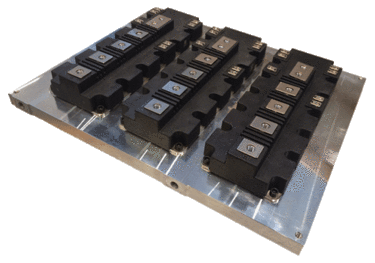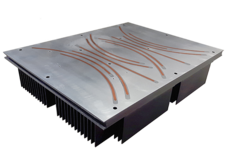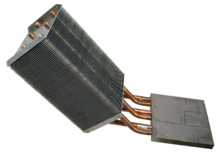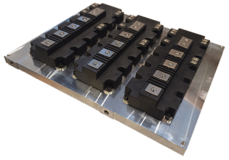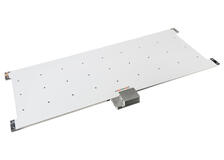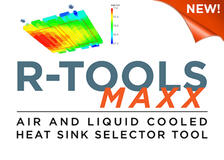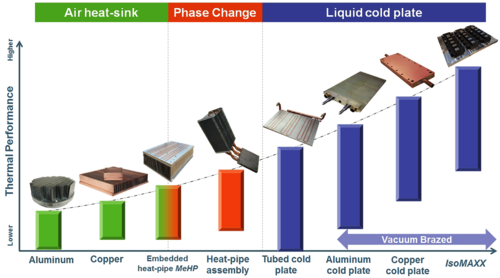
Cooling Technologies
Thermal Performance Map
Mersen uses a number of cooling technologies (air, phase change, liquid) that can be adapted to meet almost any application in any industry. Our products are custom designed to provide you the most suitable solution for your demanding application.

Resources
Videos
Innovating Cooling Solutions for Wide Bandgap Devices Thermal Management Video
In this presentation from APEC 2022, Mersen’s Philippe Roussel discusses his paper, co-written with Mersen’s Jean-Francois de Palma, about how to dramatically improve the thermal management of Wide Bandgap Devices.
Services
ENGINEERING SERVICES: From design, to prototype, to production
Mersen is ready to assist customers throughout the development of the solution they need: from the earliest stages of identifying needs right through production and logistics at the end of the process. Participation in thermal research groups and design work on several demanding thermal applications all over the globe, means we can offer the widest variety of adapted competitive designs. Mersen is capable of completing thermal testing for all air cooled products and heat pipe assemblies in house using their new thermal lab.
Mersen designs, builds and thermal test prototypes to ensure our customers’ performance needs are met. Find out how we can help you, contact us today at:
North America – Rochester, NY, USA
Email: cooling.roc@mersen.com
Europe - France
Email: cooling.lmr@mersen.com
Applications Support Tel: +33 (0)4 76 81 45 45
Asia - China
Applications Support Tel: +86 21 6760 2388
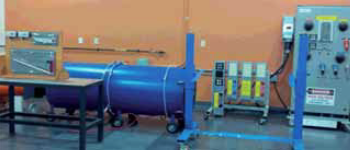
Wind tunnel testing lab

Prototype and production quality assurance
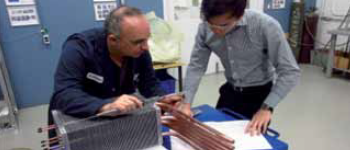
Close collaboration with customer at stage of design
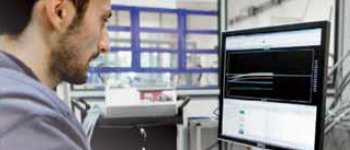
Test data collection and reports
Show less
Heat sinks selector tool
Frequently Asked Questions
FABFIN
What are the fin densities and fin ratios currently available with the Mersen Fabfin finned heat sink products?
Mersen’s Fabfin finned heat sink family comprises the MF, AF, DF, and FF designations, which respectively provide fin center-to-center (cc) pitch of 3.43, 5.49, 6.86 and 8.51mm; or in terms of fins-per-inch (fpi), 7.4, 4.6, 3.7 and 3.0. The maximum fin height-to-gap ratios are respectively MF 22:1, AF 30:1, DF 27:1, and FF 20:1. Mersen highest ratio heat sink is the Hollow Fin, which uses the DF baseplate, and it has a maximum fin height-to-gap ratio of 48:1. Comparable, state-of-the-art single- piece extrusions can presently achieve max fin ratios only as high as about 15:1. Mersen presently uses extruded fins, which are 1.04, 1.52 and 2.4mm in thickness.
How good is the Mersen Fabfin mechanically swaged fin joint?
Mersen’s patented swaged fin joint has been tested against equivalent machined fins from a solid block. Thermal tests showed an immeasurable difference on overall heat sink thermal performance.
What about mechanical integrity and long-term reliability?
Pull-out tests have been conducted and revealed the fins to break/fail before any evidence of separation occurred between the fin base and the baseplate. 3-axis vibration tests have been conducted, with swept sine resonance frequencies from 5-200 Hz, input acceleration 0.5g, with 1hr dwells, and 12hr durability sweeps from 5-200 Hz with 0.3g inputs. No cause for concern has been revealed for the swaged fin joints.
Mersen has never received any indication of failure or cause for concern from field applications, many of which have been exposed to hostile corrosive environments.
Can I specify mixed fin heights and their location in the baseplate?
Yes, almost without restriction. Flanges on baseplate peripheries, for mounting purposes, are quite common.
What is the maximum Fabfin fin height available?
For the AF, DF and FF fin spacing, 118mm is the maximum fin height. The 118mm fin height is available for corrugated (7% more surface area), serrated (2% more surface area) and flat fin styles. For the MF spacing, 49 mm is the maximum fin height.
The most popular baseplate thickness is 12.7mm (1/2in). What other thickness can be specified?
The thinnest baseplate (obtained only after fly cutting) is 8mm (0.315in). 64mm is the thickest baseplate we can supply is 64mm. However due to stresses that occur in the baseplate during swaging, we have a few guidelines to prevent the loss of flatness (i.e. bowing).
* If the size of the heat sink is smaller than 127 mm x 127 mm (5” x 5”), the baseplate thickness can be smaller than 3/8”
* If the baseplate is in between 127 to 304.8 mm wide by 127 to 304.8 mm (5” to 12”) long, the minimum baseplate thickness will be 3/8”.
* If baseplate is larger than 304.8mm x 304.8 mm (12” x 12”), ½” thick baseplate will be minimal size.
Please contact our Engineering Department to review any special baseplate thickness. We are always trying to improve our capability. We can be reached at 1-800-388-5428 or at the Applications Department.
Can the Fabfin heat sink be stored/operated at both low and high temperatures?
Yes, life time tests showed no degradation of the swaged fin-to-baseplate joint, over the test range of -40 to 125 degC. When both fin and baseplate materials are the same, this overcomes any thermal expansion problems. If mixed metals are used, Mersen has in house processes already established to prevent any thermal expansion issues.
When mixed metals are used, how does Mersen prevent corrosion between the surfaces?
For any kind of mixed metal solution, Mersen uses an electric joint compound specifically formulated for Aluminum-Copper interfaces.
How can mixed metals be used in a Fabin heat sink?
For any Fabfin, you can specify whether you want copper or aluminum for a baseplate material. You can also specify each separate fin to be which material. All the fins can be made of copper to get much better performance over aluminum fins. Or just a few above your hotspot and keep the rest aluminum to keep costs low.
Can a Fabfin heat sink be immersed in molten aluminum to form a cast / fabricated assembly?
Yes, Mersen supplies the Fabfin family to fulfill this application
What aluminum alloys are Fabfin heat sinks made from?
6063-T5 alloy for both fins and baseplate, providing high thermal conductivity and good machinability. Occasionally Alloy 1100H4 is used for fins.
Can Fabfin take an anodize finish?
YES. The perfect mechanical joint between fins and baseplate permit equal electrical current density through the body of the heat sink, ensuring an excellent anodize finish. This is only applicable to aluminum heat sinks. The anodizing process involves the immersion of the assembly in a sulphuric acid solution, which will conflict with the copper material.
* Black & Clear Anodizes are available from our factory.
What is the maximum Fabfin baseplate size available?
Currently, the maximum dimensions for a Fabfin is 521mm wide (20.5in; across the fins) x 1250mm (49in) long. Larger custom assemblies are welded together.
Does the Fabfin heat sink product cost more than a one piece extrusion?
Pound for pound, of raw material, the answer is NO. The joining of a multitude of extruded fins to an extruded baseplate does add cost, but it is not significant. Developing prototype heat sinks with Fabfin is both quicker and cheaper than tooling up for a one-piece extrusion. Mersen’s goal is to deliver the Fabfin product at the same price as a one-piece extrusion of the same weight, in the near future.
What are the types of finishes that are compliant which Mersen can provide?
RoHS
* Effective July 2006, Gold/Clear Hexvalent Chromate finish is noncompliant.
* Mersen will be moving to a Clear Trivalent Chrome that is compliant.
* Black and Clear Anodize are compliant.
* Electrolysis nickel plating is compliant.
* Solderable tabs with no lead are compliant.
DOUBLE BASEPLATE Heat sink
What is a Double Baseplate heat sink?
It is a swaged heat sink with a baseplate on each end of the fins. Heat is capable of being distributed on both baseplates. Saving space while using the heat sink much more efficiently are the keys in the use of the double baseplate heat sink.
AQUASINK
How is the Mersen Aquasink constructed?
Mersen’s Aquasink cold plate heat sink is made from 6061-T6 aluminum, with circular passageways that are gun-drilled, and then fitted with copper tubes using a mechanically expanded mandrel procedure. The joint between the tube and aluminum wall is at a contact pressure of several hundred psi, ensuring virtually negligible contact resistance at the joint. The Aquasink construction allows electronic designers to mount devices on either plate surface, and permits ease of drilling/tapping holes between the tube passageways.
When would I use a liquid-cooled Aquasink product versus an air-cooled finned heat sink?
Typically if power dissipation densities get above 30-40 W/cm2, it is likely your application will need a liquid-cooled solution, in order to maintain safe surface operating temperatures. The liquid-cooled solution requires a coolant system, which can provide typically 5 L/min of flow (around 1 USgpm).
How would you compare an entirely copper cold plate with the Aquasink product?
Copper is about twice as conductive as aluminum (typically 400 vs. 200 W/mK), but weighs three times as much (typical 8900 vs. 2700 kg/m3), and is about twice as expensive. Since material and fluid resistances are part of the overall contribution to surface temperature, at best, a 20% lower temperature is possible. However the cost and weight, coupled with adequately engineering a lighter, cheaper aluminum product, usually favours using the Aquasink product.
Can the Aquasink be anodized?
NO. The anodizing process involves the immersion of the assembly in a sulphuric acid solution, which would attack the copper pipes.
Can the Aquasink be chromated?
Clear chromate YES, gold chromate NO. The copper pipes conflicts with the gold chromate solution.
EXTRUSIONS
When and why would I use an extrusion rather than a higher performing Mersen Fabfin product?
Mersen also manufactures single-piece aluminum extrusion finned heat sinks, using 6063-T5 aluminum, which come in typical comb-shapes, as well as other varied fin structure designs. These are currently typically limited to maximum 2-5 fpi densities, and typical fin ratios of 2:1 to 5:1 (with some in the range up to max 10:1). Typically, natural convection applications (i.e. heat sinks without fans needed!) can utilize extrusions, and forced convection applications where thermal requirements are not as severe. They are also usually limited in profile volume to a 12in circular envelope; beyond that, extrusion die cost and delivery escalates!
HYPERCOOL
What is the Hypercool heat sink?
The liquid-cooled heat sink is for maximum performance in liquid cooling. A flow path is machined into two plates that are later soldered or brazed together. The flow path is designed to optimize the performance of the heat sink based upon the heat source layout and machining.
How is the Hypercool different from the Aquasink?
The Aquasink is limited by how close the tubes can be placed by each other. In the Hypercool, the flow path is machined and even more flow paths can be put under your hottest heat sources. The greater the time the fluid spends under your heat source, the more heat it will draw out.
THERMAL MODELING SUPPORT
What will the new Mersen online software tool allow me to achieve?
R-Tools allows electronics designers to interactively design, very quickly and accurately, their own heat sinks, using the products being offered by Mersen. There will be supportive libraries of electronic devices, interface materials, and fan types to choose from. A lot of times the electronics designers would like to perform their own “WHAT-IF” scenarios. R-Tools will allow them that flexibility. Your design turnaround time will be significantly reduced!
How does this compare to more complicated CFD or experimental predictions?
R-Tools will allow accurate 3D thermal modeling of the heat sink, whether it is an air-cooled finned heat sink or a liquid-cooled heat sink. The solutions have been validated against CFD and/or experimental findings. Make no mistake about it - the user will be technically informed, and further support in this regard will always be made available to ensure confidence in the predictive capability.
ENGINEERING
How Mersen can help you design and optimize the heat sink to your requirements?
We can help you by:
* Early collaboration on a new product to help you design a new heat sink design that you can work with.
* Deliver Thermal Engineering support on demand
* Share skills and resources
* Decrease design time and provide innovative thermal design
You can reach us at 1-800-388-5428 or at the Applications Department. We will be happy to speak to you and help you on your thermal issues.
Show lessLocations
With local technical support offering close-to-the-customer assistance.
With industrial operations in all three major economic regions of the globe, Mersen offers global service with close-to-the-customer support. Each location brings is a specific product expertise and is ISO 9001 registered and RoHS compliant. The facilities operate on a continuous improvement philosophy and a “pull” manufacturing strategy.

